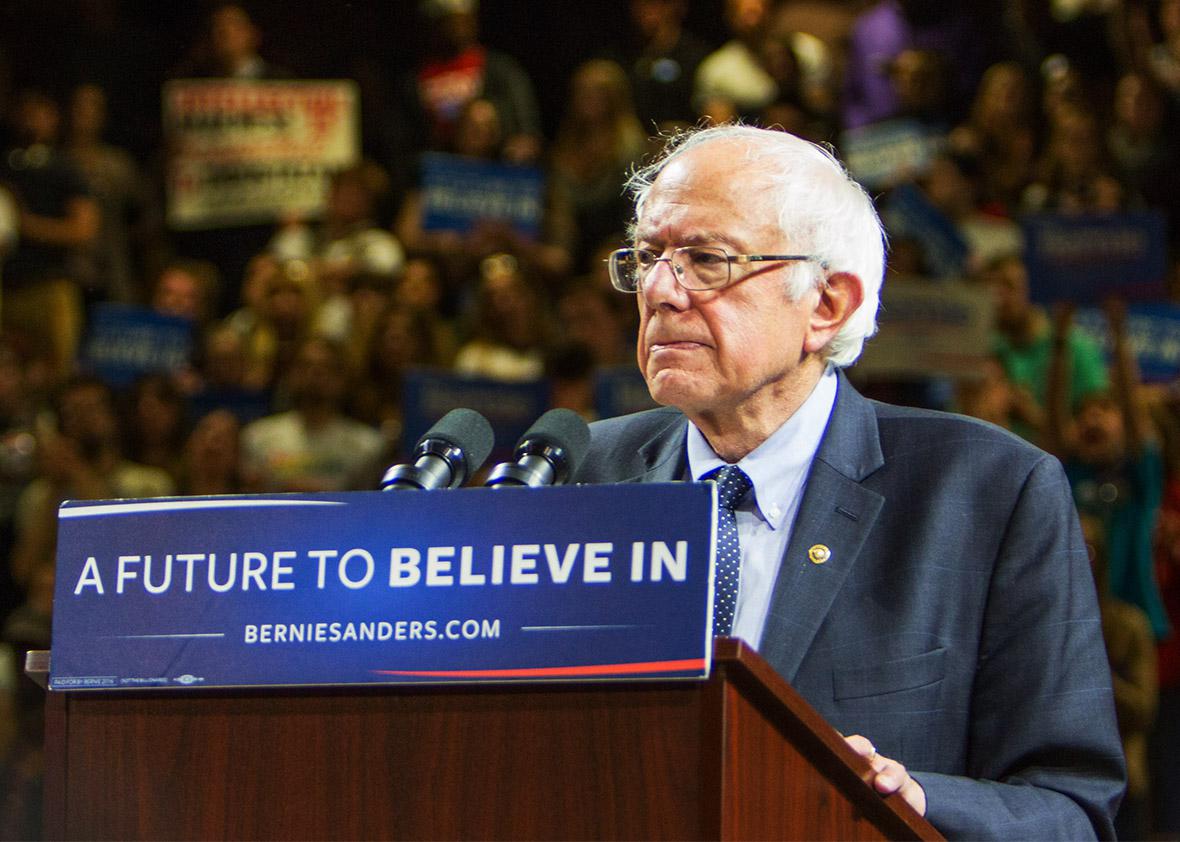Donald Trump’s struggles with the delegate selection process, which has led him to believe that the nominating process is “rigged” against him, have of late given him a sort of one-sided kinship with Sen. Bernie Sanders. “I’m no fan of Bernie Sanders, OK, I’m no fan at all,” Trump said during his Tuesday town hall with CNN. “But every time I turn on, he’s winning, he’s winning. Every week after week, he wins, he wins, he wins, he wins. And then I watch you and I watch all of the pundits, they say, but he can’t win. You know why?” Why, Donald? “It’s stacked against him. It really is. It’s stacked against him. In his case, it’s superdelegates.”
We already knew that Donald Trump didn’t have a strong understanding of Republican delegate allocation. Now we know that his grasp of the Democratic process isn’t so sharp either. Sanders is not losing because of superdelegates. Clinton leads him by 251 pledged delegates, according to the Associated Press’ count, a much wider lead than then-Sen. Barack Obama ever held over her in 2008. Unless Sanders can somehow shift the ground and pick up significant wins in the large remaining nominating contests of New York, Pennsylvania, New Jersey, and especially California, he will not come anywhere close to making up the pledged-delegate deficit.
The Sanders campaign’s recognition of its narrow window for overtaking the pledged-delegate lead, combined with its interest in still winning the nomination, has led to some … mixed messaging on superdelegates, to put it politely. In February—before Clinton had taken her sizable pledged delegate lead—Sanders’ campaign manager, Jeff Weaver, said on MSNBC that “if the people in the states choose Bernie Sanders over Hillary Clinton, I cannot imagine that the superdelegates would overturn the will of the people in this case.” These days, the Sanders campaign is acknowledging that its strategy for winning the nomination, if it doesn’t get the pledged-delegate lead, rests on swaying to its side both outstanding and Clinton-supporting superdelegates up to and potentially through the convention vote.
The Sanders campaign may be trying to have it both ways on superdelegates, but getting called out on this doesn’t seem to stop them from doing so. This creates a problem for the Clinton campaign: Though Clinton will almost certainly end primary season with a safe pledged-delegate lead, the race has been close enough that it’s much less likely she’ll end up with a majority of delegates through pledged delegates alone. In 2008, Obama wound up about 350 delegates short of winning the majority on pledged delegates alone. Clinton could have taken her fight all the way to convention balloting had she wanted to give herself more time to wheedle superdelegates. But it was very clear that wasn’t going to happen. So she dropped out and, at the convention, instructed her pledged delegates to support Obama in a show of unity.
It’s possible that Sanders would do what Clinton did in 2008 if he loses the final pledged-delegate count. Campaigns, including Clinton’s in 2008, have a tendency to promise that they’ll fight all the way to the convention as a means of rallying supporters, but once the voters have finished voting, they call it a day.
But Hillary Clinton in 2008 was a much different person than Bernie Sanders is in 2016. She was, and is, a party player, and taking her doomed fight to the convention in 2008 would have crippled her legacy within the party and her chances for running again in the future. Sanders, as the Clinton campaign likes to point out, is much less a party man, and he’s also in his mid-70s, meaning it’s highly unlikely that he would run for president again. What does he have to lose by contesting the convention other than the admiration of his peers, which he never had in the first place?
Good lord, would the people who run the Democratic Party loathe him if he did this. His challenge would obstruct Clinton’s four-day PR showcase. It would hamper her efforts to bring Sanders supporters into the fold before November. It would get in the way, basically, and draw media attention away from the Republicans’ own historically nightmarish spectacle.
Maybe, then, the anger that Democratic Party leaders would feel would finally provide the impetus needed to kill off superdelegates. Sanders would show that superdelegates, instead of saving the party from electoral disaster, instead make it easier for an outsider candidate to cause problems.
Democrats created superdelegates to give party leaders a final check over nominations after the reforms of the 1970s, in their opinion, gave too much power to primary voters. But the superdelegate trigger has never been pulled. Voters have always chosen nominees that the party deems acceptable, and it would destroy the party if superdelegates ever did overturn the clear preference of the voters.
What superdelegates have done is dilute the pool of pledged delegates and make it that much harder for the leading candidate to compile a delegate majority solely from pledged delegates. That in turn gives someone like, say, Bernie Sanders a justification for extending his fight into the convention if he’s willing to shatter certain norms of intra-party etiquette. And as you’ve probably noticed, norms aren’t doing so hot in politics these days.
The Democratic Party establishment—and I don’t necessarily mean “establishment” in a pejorative way; it’s simply the best description of what superdelegates are as a collective—won’t kill off their special convention votes for nothing. One fancies it would be nice to have a special convention vote, after all. But if Sanders’ crusade proves that superdelegates just make the process more aggravating for the party, maybe that will be enough to bury them, or at least slash their number.
